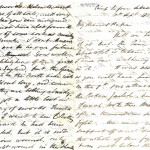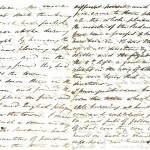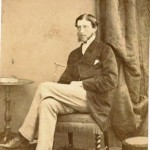John Murray, of the Murray family of Polmaise Estate near Stirling, was just 23 when he left for The Crimea on 24th November 1854. Murray received his commission as Lieutenant Captain in the Grenadier Guards in the July of that year and was part of the second wave of troops sent out from Great Britain to fight in the Russian peninsula. In the papers of the Murray family, held at Stirling Council Archives, there are 240 letters written between John and his family during the time that he was away in The Crimea, and in his letters home, John gives a fascinating account of life as an officer in that conflict. The letters give intimate detail of life in a military camp and support what we know about the often appalling conditions suffered by the soldiers in The Crimea. There are also accounts of the military action that John saw and took part in and these include an account of the raising of the Siege of Sevastopol, signalling the end of the campaign: –
“Well, we have done it at last. The Town of Sebastopol is taken, and I have been walking about in it. It was assaulted as you will have heard on the 8th. Our attack on the Redan failed, but the French took the Malahoff after a tremendous hard fight. We were in support and saw the whole of the fighting from just below the look out place. We came away at dark thinking the attack had failed but were awoke during the night by hearing the Russians blowing up their magazines and in the morning found they had left the town. I went down there in the afternoon and found the whole place on fire, and French and English pillaging all over the town. I never saw such a scene in my life. The Russians had left quantities of powder all over the town in the different houses and as the fire came to them blowing up the whole place. The inside of the Redan must have been a fearful place to have been in. It was blown up in all directions by our shells and the fight on the 8th left a good many relicks in the way of dead men they were lying thick in all directions. I have just come back from the town which is still burning as hard as it can and explosions going on and full of fellows carrying off what ever they can lay hands on such as chairs, tables, cups, dishes, new Russian coats, caps, swords, helmets and pictures of all sorts and everything else you can imagine. They must also have found liquor of some sort as numbers are drunk. I don’t know what are to be our future plans. You will most likely hear of them first in England but the opinion seems to be the North side will not hold out long and some think they are bolting already. I have got a little “loot” in the way of swords, trumpets etc I went to see C battery as I heard he had been wounded but it is not a serious wound only a slight wound in the shoulder and will soon be well. I am all well, which I hope you all are having good sport. Give my love to Mama, Min & the boys.”
This vivid account of the events of 160 years ago is supported by what we know from other eye witnesses. John saw no further action in the war and returned home in 1856 to take up his role as heir to and manager of the large Murray estates around the Stirling area.


